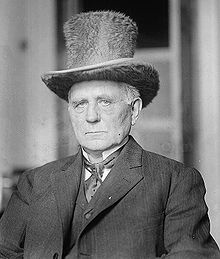Champ Clark
James Beauchamp "Champ" Clark (* 7. March 1850 in Lawrenceburg , Anderson County , Kentucky , † 2. March 1921 in Washington, DC ) was an American politician of the Democratic Party , a member of the US House of Representatives for Missouri and Speaker of House of Representatives .
biography
Professional career and MP
After attending common schools , he studied first at the University of Kentucky and then at Bethany College in West Virginia , which he finished in 1873. He then studied law at the Law School of the University of Cincinnati , graduating in 1875. He was also President of Marshall College in West Virginia from 1873 to 1874 . After his admission in 1875, he not only began working as a lawyer , but was also the editor of a daily newspaper . In 1876 he settled in Bowling Green and was between 1878 and 1881 public prosecutor ( City Attorney ) of the cities of Bowling Green and Louisiana . Later he was from 1885 to 1889 first deputy and then representative of the prosecuting attorney ( Prosecuting Attorney ) of Pike County .
Clark began his political career as a member of the Missouri House of Representatives , to which he was elected in 1889 and 1891. He was also a delegate at the Trans-Mississippi Congress in May 1891 . In 1892 he was the first time for the Democrats to the US House of Representatives voted and represented there for a legislative period of 4 March 1893 to March 3, 1895 9. constituency Missouri. In 1894 he was defeated by his Republican challenger William M. Treloar in the congressional elections .
In 1896 he won again against Treloar. After eleven subsequent re-elections, he again represented Missouri's 9th Congressional electoral district in the US House of Representatives from March 4, 1897 until his death.
Minority Leader and Speaker of the House of Representatives
Between 1908 and March 1911, Clark was a minority leader as parliamentary group chairman and thus opposition leader of the Democrats in the House of Representatives.
He was then from April 4, 1911 to March 3, 1919 Speaker of the House of Representatives and thus had the longest term in this office before his predecessor Joseph Gurney Cannon .
For the 1912 presidential election in the United States , Clark was among the possible candidates , alongside Woodrow Wilson , the governor of New Jersey , Judson Harmon , the governor of Ohio , Oscar Underwood , a congressman from Alabama , and Thomas R. Marshall , the governor of Indiana Democratic presidential candidates. At the Democratic National Convention in Baltimore there was ultimately a duel between Clark and Wilson, with Clark always taking first place in all ballots, but at no time was within reach of the necessary two-thirds majority. When the three-time presidential candidate William Jennings Bryan - later Secretary of State in the Wilson cabinet - then used his influence and got a number of delegates to vote Wilson, Wilson received the necessary majority in the 46th ballot.

After losing the Democratic majority after the elections to the 66th US Congress , he was again minority leader and opposition leader of the Democrats from March 4, 1919 until his death . In the elections to the 67th US Congress in 1920 he suffered a defeat against his Republican challenger Theodore W. Hukriede . Champ Clark passed away one day before the end of his mandate. He was buried in Bowling Green City Cemetery .
The Champ Clark Bridge on US Highway 54 , completed in June 1928, was named in his honor. Its five fields cross the Mississippi River and connect the city of Louisiana in Missouri with the eastern bank of Illinois . His home on Bowling Green is a Missouri National Historic Landmark .
His son Bennett Champ Clark was a US Senator for Missouri and a federal appeals judge for the District of Columbia .
literature
- Champ Clark: My Quarter Century of American Politics. 2 volumes. Harper, New York 1920. ( autobiography )
- Geoffrey F. Morrison: A Political Biography of Champ Clark. Dissertation to the Philosophiae Doctor . St. Louis University, 1972.
Web links
- Champ Clark in the Biographical Directory of the United States Congress (English)
| personal data | |
|---|---|
| SURNAME | Clark, Champ |
| ALTERNATIVE NAMES | Clark, James Beauchamp |
| BRIEF DESCRIPTION | American Democratic Party politician and Speaker of the House of Representatives |
| DATE OF BIRTH | March 7, 1850 |
| PLACE OF BIRTH | Lawrenceburg , Anderson County , Kentucky |
| DATE OF DEATH | March 2, 1921 |
| Place of death | Washington, DC |



